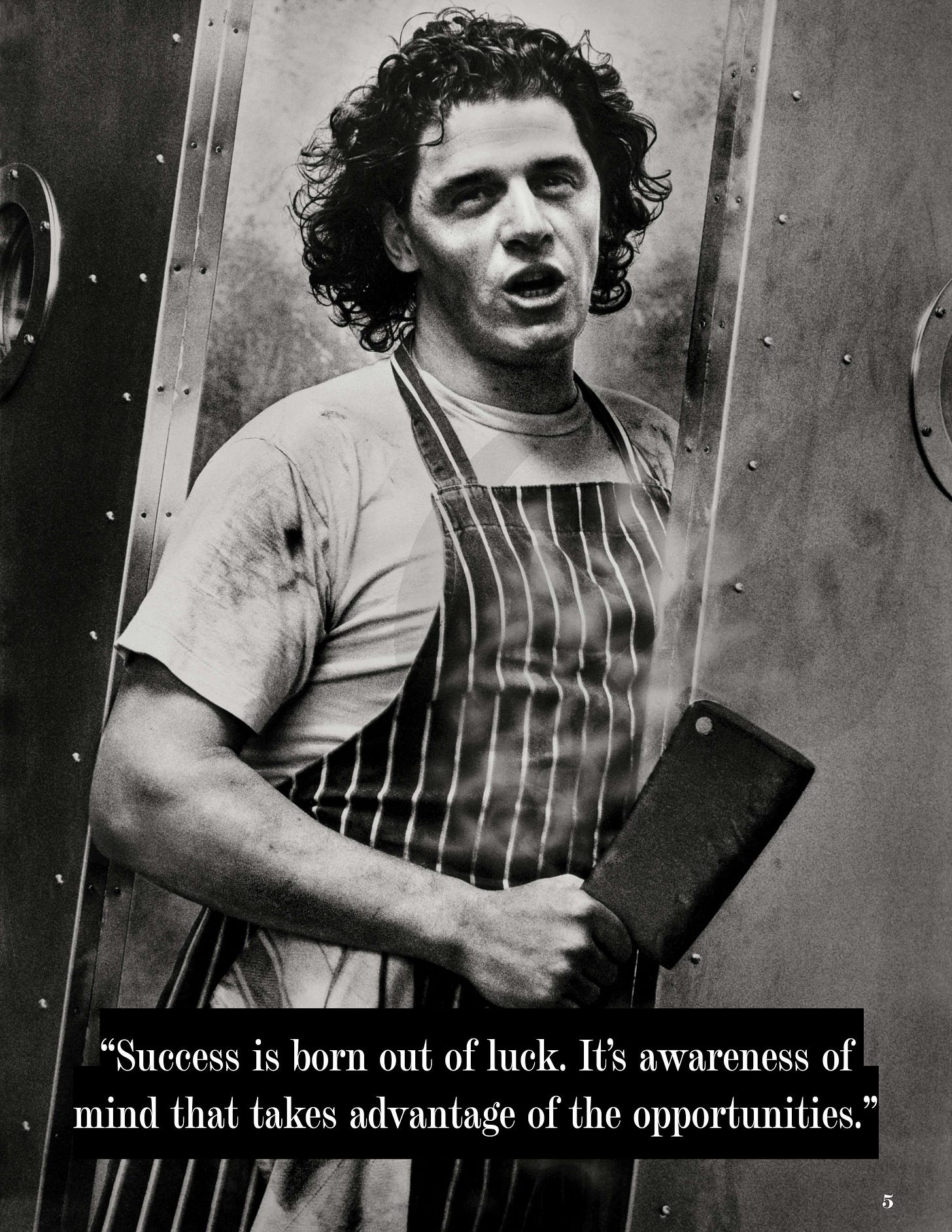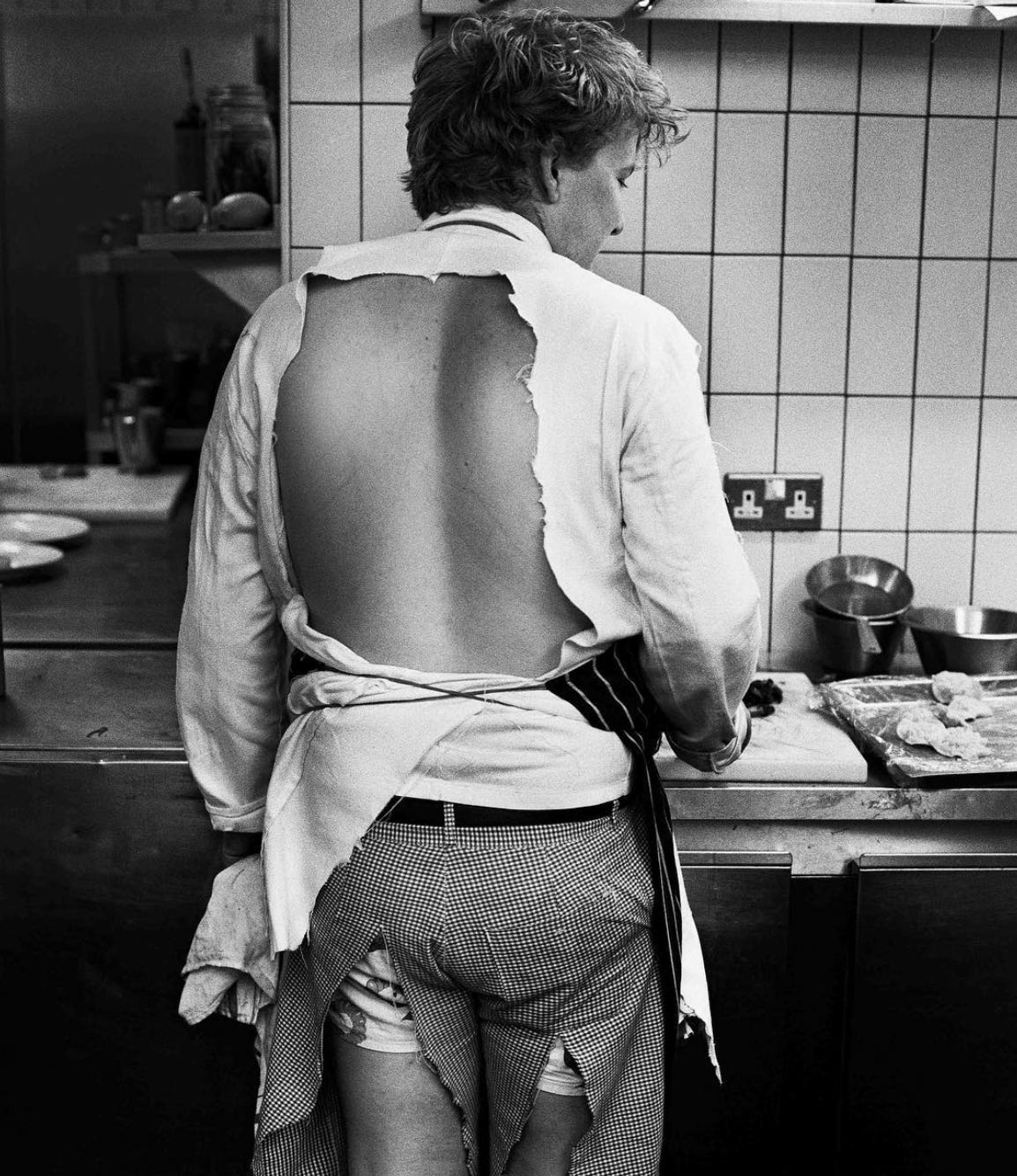Marco Pierre White
The Comeup
Marco was born into a world that no longer exists. It was one of close-knit communities; where honest work and gratitude reigned supreme. His life story is nothing short of extraordinary. He was the youngest chef to attain three Michelin stars, and he put the UK on the map of the culinary world, being the first Briton to do it. Not only did Marco revolutionize the world of gastronomy, he paved the way for many modern day culinary greats.
Early Life & Tragedy
Marcos’ father, Frank White, was a strong man in every sense of the word. The greatest gift he gave his son was instilling in him a mindset of relentless determination, which would later become the very foundation that led to Marco’s success.
Marco’s journey and childhood was far from smooth-sailing. When Marco's younger brother, Simon, was born, their lives changed forever. Their mother, Maria-Rosa Gallina, passed away due to complications from childbirth. Marco witnessed her being taken away from him in front of his very eyes. To this day, he recalls the moment as the “most defining moment” of his life.
Empty Glass Cup
After her death, Frank figured it was best to send Simon off to live with his Italian relatives while he took care of Marco and his older brothers. Marco chose his mother's bible as a keepsake, and her name was never mentioned again. He refers to this period as the moment an empty glass cup shielded him from his environment. He soon found purpose in the world of cooking & grande cuisine, but he acknowledged that it was only after he hung up his apron did he break the glass and develop himself spiritually.
The Hero’s Journey
We’ve all heard of the hero’s journey. We’ve seen it play out in every movie, where the protagonist starts out with nothing in his favor. We root for his success. Above all adversity. No matter how incredible the storyline, we know it’s not real — it’s fiction.
Maybe it’s just me, but this is one reason why I’ve always been drawn to biographies, or at least their adaptations. Movies like American Made, and even Netflix’s Narcos feel different because you know — it’s real.
Marco Pierre White’s come-up looks like a script right out of Hollywood. All the odds were stacked against him, yet not only did he make it out, he thrived. He forged a world of his own. He revolutionized gastronomy and along the way inspired the lives of millions.
The Culinary Journey
At the age of 13, Marco's father began treating him like an adult, and he started working a milk delivery route before school each day. Every morning, he rose before the Sun to deliver milk around his neighbourhood. Every. Single. Day. Marco didn’t get sent out to work just to bring in the extra £5/week. While his father surely made use of the spare change, it was in essence the reduction of the first ingredient that made Marco great — his indomitable work ethic.
“He taught me how to work hard. He taught me how to be disciplined. He taught me how to be punctual. He taught me how to never throw in the towel... and if I threw in the towel, he taught me to pick it up. Never give in.”
It was a cold winter’s morning in January, 1978. Frank had a mission for Marco. He was given some money, and told to take the trip to Harrogate, where he was going to knock on the kitchen doors of every hotel until he got an apprenticeship. Frank, who was a chef in his own right, surely didn’t realize the significance of the moment. He empowered his son to embark on his hero’s journey, and create his own world he did.
Marco got himself a job at the Hotel St George as an apprentice chef. That journey he embarked on marked the first domino, in a long chain that eventually culminated in greatness. From there, Marco slowly but surely found a way to make the steps up and work at other world-class establishments; from the likes of the Box Tree in Ilkley, Le Gavroche with the Roux brothers, La Tante Claire with Pierre Koffman, Le Manoir with Raymond Blanc, before eventually starting his own restaurant, Harveys, in London.
Marco on Luck
While Marco's talent and determination played a significant role in his success, he acknowledges that luck was also a contributing factor. Albert Roux gave Marco a job simply because he once had a fantastic meal at the Box Tree, where Marco was working at the time. Marco knocked on random doors. He stumbled across a random Egon Ronay guide. Luck. A heaped tablespoon of it. It definitely played a part, and that’s not a bad thing. Luck is everywhere. But it was also his unwavering belief in himself and the courage to seize these opportunities that allowed him to make the best of whatever luck he found on his lap.
Marco’s Temper
Marco is quite notoriously known for his fiery temper and no-nonsense approach when it comes to his conduct in kitchens, which famously made Gordon Ramsay cry. Marco is just that guy. He doesn’t hold anything back. He speaks his mind. The picture you see below is of someone who once complained that it was “too warm” in the kitchen. Marco surely fixed the issue, as he always does!
“Cooking is a philosophy, it’s not a recipe”
— Marco Pierre White
It’s been a few months since I’ve written this piece, and honestly it feels like a year. While I don’t know Marco personally, his influence on my work has been profound. He belongs to a class of chefs that I mark the golden age. All they were concerned about was creating REAL FOOD. Yes, they created works of art. But they also tasted so damn good.
“To me, food is a lie if it is presented in such an attractive way… When the package is so tempting, so beautiful and cosmetically stunning
But then after the TASTE is missing!”
— Raymond Blanc
These days, Michelin star restaurants are so concerned with making something new that they forget about the customer’s experience. Molecular Gastronomy is a joke and should be outlawed. That’s a topic for another article.
If I had a time machine, the first place I’d travel back to was Harveys in the late 80s. Marco was truly a master of injecting the intangibles in his dish. Anyone could recreate them. It truly wasn’t that complicated. But they just couldn’t do it like Marco did. An enigma of a chef.
This article was originally published in Issue 03 of the WarKitchen magazine. You can read it in its original form here. If you’re on the newsletter, you’ll be the first to know when the next issue drops: warkitchen.net.
Thank you for reading the WARKITCHEN. Till next time 🥂






